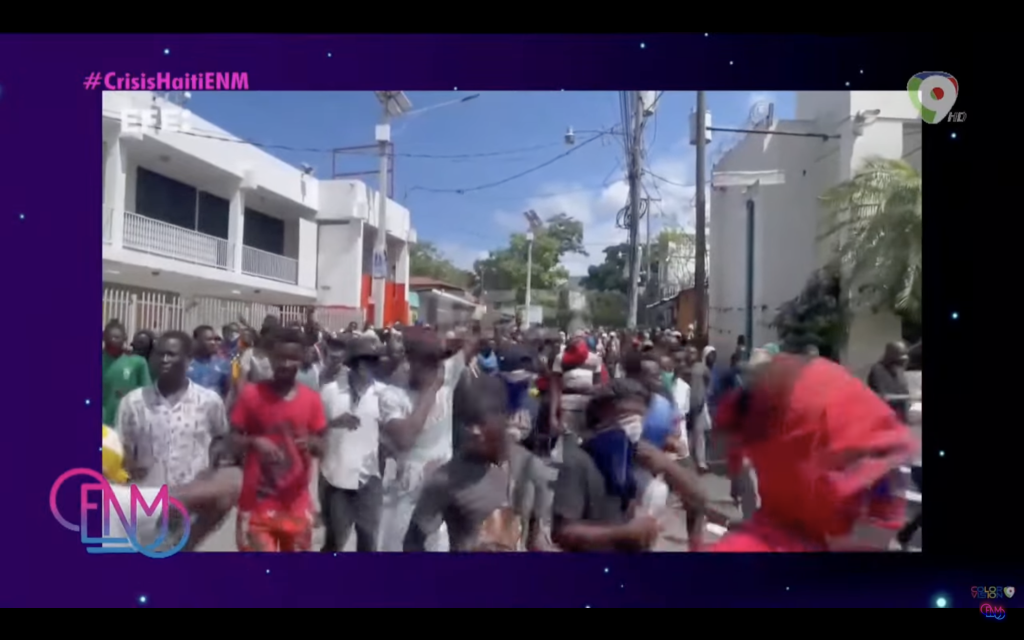
Santo Domingo senator Faride Raful (PRM-National District) hosted together with journalists Camila Duran and Diana Lora a panel on Tuesday, 28 September 2022 with the participation of experts explaining the nuances of what is happening in Haiti. The panel called for a change to the traditional focus that has prevailed in Haiti and has not been working over the past decades. The participants were negotiating guru Nelson Espinal; former deputy minister for international cooperation at the Ministry of Economy Inocencio Garcia; 2016 presidential candidate in Haiti Jean Bertin and university professor Fernando Peña.
Jean Bertin said that all the truth about what is happening in Haiti is not circulating in the Dominican media nor in the international media. He says that Haiti is a large country and the crisis is concentrated in specific urban areas. He said in 60% of the country, where most of the population lives, are not under siege by the armed gangs. He is against the international community intervention in Haiti, saying that is the not the solution as the past experiences have proved. He is against a military solution for Haiti. He said in 1992 the embargo killed the weak economy of Haiti. He accused former President Bill Clinton of destroying rice production in Haiti. He said the installation of the UN Minustah peace-keeping force resulted in the arming of violent gangs in the Port-au-Prince slum area of Cite of Soleil. These later evolved and today are those that control strategic spots and routes in Haiti, not the entire Haiti.
Fernando Peña, coordinator of the Observatory of Public Policies, says Haiti is suffering the longest non-governance situation in modern times and today is the most impoverished country in the Western Hemisphere, without any institutions. He said those who sell the idea of failed states are those who built this. He said Haiti is living a special situation after the death of Jovenel Moise. He said everyone knows in Haiti who killed Moise. He said those that killed Moise were those who articulated a gangs plan to ensure their continued control in that part of the island. The gangs were then in control. He said the millions in Haiti have been demanding democracy and other issues. He spoke out against covert US intervention in Haiti. He called for a transition in Haiti to civilian institutions in Haiti that are still alive and says the media does not cover this abroad or in the Dominican Republic. He pointed out that in Ouanaminthe all is normal, where Dominican capitals are invested in free zones.
It is a violent conflict where institutions are not capable of managing it. He said that he was told is that for every police there are six armed persons in organized gangs. He said political insurrection operates parallel to armed gangs. He said for every police with a firearm there are gangs with assault weapons. In terms of military logistics and police control it is materially impossible to control these. He said that Henry Ariel is not in capacity to manage the conflict.
Nelson Espinal Baez commented that there cannot be elections if the streets are not usable, if people can’t go to vote. How can the political candidates campaign if there is not a minimum level of security? A democratic solution everyone aspires to will not come without control minimum so that people can feel safe to vote, he says. Steps need to be taken to prepare for the country for the election.
Nelson Espinal Baez says there is a proposal of 30 important organizations inside Haiti. He says the Dominican people want to hear the solution proposals of these institutions.
Inocencio García, a member of the Fuerza del Pueblo political party of former President Leonel Fernandez, concurs that the starting point is that there are no institutions in Haiti. In Haiti there is no working state, he said. He observed the parliament and cassation court are shut down. He described the government presided by Henry Ariel as a defacto government and remarked there is a collapse of the state in Haiti. He said as a consequence there is no state that controls the territory and in consequence those in control are the gangs, mostly concentrated in the Port-au-Prince. He said on one hand you have the violent gangs and on the other the authentic protest manifestations. He said the population wants normalization. When asked if Haiti alone is in conditions to confront the situation of collapse of the state, he commented it is not. Focusing on the participation of the United Nations, he said that military interventions have not worked, regardless of being unilateral or multilateral. He says the people of Haiti need to agree as they did in the Hotel Montana talks. He said it is difficult to go forward with the 11 September agreement of Hotel Montana. He does not feel that Haiti needs a military intervention. Rather he spoke of an accompaniment to elected authorities, but for that previously the gangs needs to be disarmed.
He said first the countries that supply the weapons need to impede these weapons being exported from Miami, Florida to the gangs in Haiti. Next he favors international support to the National Police to disarm the armed gangs. But he warns a purge of the Police is necessary because he says 40% of the Police is working in cohoots with the gangs.
Follow the story:
Esta Noche con Mariasela 1
Esta Noche con Mariasela 2
Acento
Diario Libre
Acento
Acento
29 September 2022

